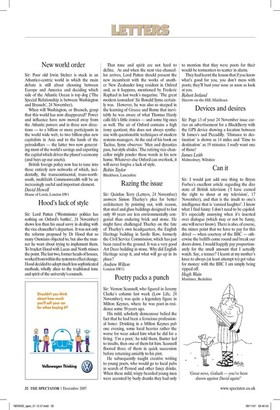Hood's lack of style
Sir: Lord Patten ('Westminster politics has nothing on Oxford's battles', 24 November) shows less than his usual savvy in dealing with the vice-chancellor's departure. It was not only the reforms proposed by Dr Hood that so many Oxonians objected to, but also the manner he went about trying to implement them. To bracket Hood with Lucas and North misses the point. The last two, former heads of houses, worked from within the system to effect change; Hood decided to adopt much less sophisticated methods, wholly alien to the traditional tone and spirit of the university's counsels.
That tone and spirit are not hard to define. As and when the next vice-chancellor arrives, Lord Patten should present the new incumbent with the works of another New Zealander long resident in Oxford and, as it happens, mentioned by Frederic Raphael in last week's magazine 'The great modern iconoclast' Sir Ronald Syme certainly was. However, he was also so steeped in the learning of Greece and Rome that inevitably he was aware of what Thomas Hardy calls life's little ironies — and some big ones as well. The air of Oxford contains a high irony quotient; this does not always synthesise with questionable techniques of modern systems managers. At the end of his book on Tacitus, Syme observes: 'Men and dynasties pass, but style abides.' The retiring vice-chancellor might ponder these words in his new home. Whatever else Oxford can overlook, it will never forgive a lack of style.
Robin Taylor Blackburn, Lancashire





































































 Previous page
Previous page